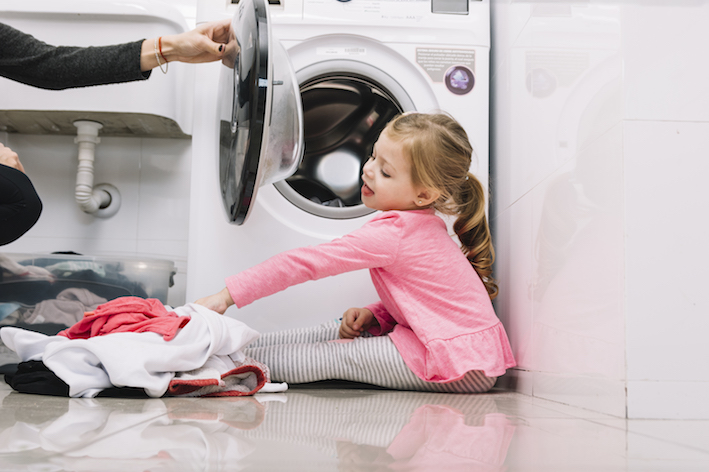A few families on vacation returned to their resort after a long day of touring, tired and hungry. The children, none too young, occupied all the available sofas and chairs and grabbed the TV remote. They were lovingly served water by the adults, who were also unpacking the day bags and ordering for food and setting up the rooms for the night. The children were oblivious to the work that was going on around them. They had just started watching a movie from their bucket list.
Does the scene look familiar? Yes
Does it feel right. Well…. NO.
A joke has been doing the rounds lately. It goes something like this – “We are a generation who had to always listen to our parents and now we have to listen to our children. Who will ever listen to us?”
We know who should. But, why do they not? Here’s what I feel.
Most of us are products of middle-class parenting, of an era where ‘sufficient’ was considered opulence. We were taught to ‘adjust’ either because resources within the family were limited or the external environment itself offered limited freedom. Within the family, constraints existed because of nominal salaries or more members in the family or extended responsibilities of parents and so on. In the external environment, freedom was restricted because of reasons like regulated career options or lack of affordable and convenient infrastructure (e.g. traveling within the country or abroad), or lack of free access to information.
A lot has changed for our next generation. Today, most of us live in financially comfortable nuclear families and our extended families are also self-sustaining and nuclear. We are free to enjoy the fruits of our labour the way we want to. Hence, we are able to provide for our children without holding back. The world is globalized beyond recognition and the information highway is free for all. The resources and exposure opportunities that are available to children today is ever-expanding and incredible.
Yes, a lot has changed for our next generation.
Our next generation also has a generation of redemption-seeking parents behind them.
- We want them to have what we could not
- We feel guilty making their lives even a teeny-bit hard
- We try to discipline them and when a shadow of sadness falls on their face, we see ourselves in them and back off
- We want to vicariously enjoy life through them, a life that we were not privileged to have
This joyride of the initial years of childhood hits a bumpy track as the child grows up and starts to display irreverence to family members and towards responsibilities. We then say, “this generation has had everything so easy.”
Hullo, why not? We served it on a platter to them!
Bringing up children who are responsible and empathetic requires conscious parenting. In my continuing journey of unlearning and learning parenting, I have observed successful parents apply a few foundational principles that I share here.
Setting boundaries and sticking with them
Parents looking for a respite from pestering children relax boundaries as an easy way out.
- “You can watch iPad today since I am busy on a call.” (which is every day)
- “Alright leave the veggies just for today.” (and every other day)
- “You came late from play and now you are too tired to finish homework. You are not getting to play tomorrow.” (But they will get to play, because we will be busy on a call tomorrow.)
Flustered with a lack of control over events every day, parents wonder where they are going wrong. This is a tough situation that requires parents to have a strong resolve.
As it is obvious, boundaries are meant to be respected. Agreements are meant to be adhered to. Children develop clarity of thought when we stick to boundaries and hold them accountable. The fact that we mean what we say, removes any confusion in their minds about right and wrong.
Clarifying what discipline means
In order for children to follow a certain routine, it is important for them to know what discipline means. I define it for them as,
“Discipline means doing what you NEED to do right now, even though you don’t feel like doing it.”
Anonymous
Opportunities to reinforce the importance of discipline is, for example, when they say they
- don’t feel like keeping their uniforms ready the previous night
- don’t want to clean up after their work
- don’t want to finish their homework before going to play
Being firm on such instances anchors children and does not let them drift through life meaninglessly – now and more so when they are grown-ups.
Having lots of conversations
The importance of this cannot be over-emphasised. Conversations help:
Develop empathy and closeness. Children, then, will not make choices solely based on “what’s in it for me?” Children in close-knit families take on responsibilities out of choice, because they feel they are an integral part of running the household.
Remove blind-spots. We hear tragic stories where parents were not aware of what their child had been through, until things went out of hand. A culture of having heart-to-heart conversations helps parents develop a strong relationship with their children, so that they can notice a slightest change in behavior.
Treating mistakes as precious opportunities
On one hand parents find it hard to enforce discipline, and on the other they take their children’s mistakes as a bad reflection on themselves. If seen in the right light, every instance when the child makes a mistake is a chance to sit with the child and discuss why it happened and what they can learn from it.
Instance 1:
Parent: “Why do you think you made a mistake in solving this problem?”
Child: “I got confused in counting the decimal places.”
Parent: “That’s great! Now you know this was not very clear to you. Let’s try solving a few more questions of this type to understand it better.”
Instance 2:
Parent: I know you lied to me that you did not break the mobile screen. Why did you not tell me the truth?
Child: I was scared that you would scold me.
Parent: Yes, I might have got angry for that moment because a mobile is an expensive gadget and it is also very important for my work. You have to be very careful while handling fragile things. Having said that I need you to know that you are more important to me than anything else in this world. From now on you won’t lie to me. We will trust each other to tell the complete truth. Is that a deal?
Child (with a hug): Yes!
A child who knows he is allowed to make mistakes, and that he will receive the right guidance will not be aloof and alienated.
Sharing responsibilities at home

Early on, giving small responsibilities to children makes them empathetic towards the role of adults in the family. Simple things like packing vegetables in fridge bags , taking out the garbage, watering plants and serving food to guests makes children feel connected with the family. Parents who give their children an easy, responsibility-free life do them no good.
“Giving responsibilities to children is a way of letting them know that they are not only loved but needed.”
Wendy Mogel
Creating an environment of mutual respect
An over-indulged child takes others for granted and becomes disrespectful. There comes a point when a parent might get furious and say, “Don’t you dare talk to me like that!” However, respect is commanded, not to be demanded. The family culture and house rules need to be in line for a respectful environment to evolve.
A sacrosanct rule is to never criticize or reprimand children in front of others, even as a joke. We learn in corporate culture that feedback is to be shared 1:1. But we forget to apply this in our personal lives.
Then again, if a child does show disrespect without provocation, it is important to set down the ground rules clearly and in time.
- “In our family, we respond promptly when our name is called out. I want to make this very clear. Is this understood?”
- “You have the right to not agree with me on a topic. But banging the door is not something that we do in our house. I hope you won’t do this again.”
The message should be clear and firm. Very importantly, parents should demonstrate the same behavior that they expect from children.

A friend of mine once said, “I don’t believe in being my child’s friend. He has many friends. But he only has one set of parents.” It wasn’t said in the extreme disciplinarian sense of parenting, so I agree. At least to the second part. Our children have only one set of parents. Let’s be what we are meant to be for them.
Originally published on LinkedIn.


